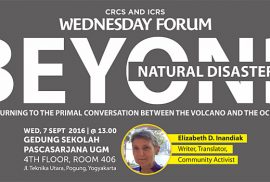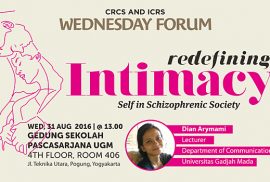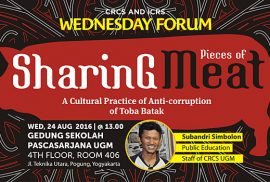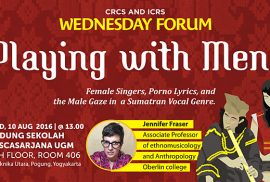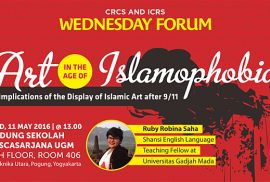
Abstract
In many Muslim-majority societies,the widely accepted Islamic doctrine that men are to act as the ‘imam’ or leaders of the family lies at the bedrock of Muslim masculinity and male religious identity, but its meaning changes for Muslim men who live as a minority in liberal and increasingly secular societies such as Australia. Based on a sociological study of the issues and challenges facing Southeast Asian Muslim men living in Melbourne, I argue that the family does serve as a secure zone for preserving and exercising Islamic-associated practices of masculinity, but also that men are pressed to redefine the meaning and continually negotiate practices of leadership to cope with the demand for individual freedom and autonomy in the family as fits the much different social context. Finally, I call for more attention to the importance of masculinity as an analytical framework in religious studies.
Speaker
Rachmad Hidayat is a fellow and Project Director in the Kalijaga Institute for Justice, State Islamic University Sunan Kalijaga, a research associate at the Asia Institute, the University of Melbourne and previously was a visiting scholar at the Institute for Politics, Religions and Society, the Australian Catholic University. He earned a PhD in 2016 and MA in 2010 both at Monash University. Rachmad had worked at the State Islamic University Sunan Kalijaga as a project officer and research officer for programs fostering gender mainstreaming in religious contexts. His academic interests focus on how the discourse of masculinities and femininities sociologically shape and are shaped by dominant imbalance power relationship in families, institutions, academia, and religion. He has published Ilmu yang Seksis (Sexism in Sciences, Jendela 2004), Men’s Involvement in Reproductive Health, an Islamic Perspective, (with Hamim Ilyas, PSW 2006), some book chapters and journal articles about gender and masculinities.
Wednesday Forum News

Abstract
Scientists say that we have entered the Anthropocene, the era in which the influence of humankind on the many disasters on our earth is decisive. But ancient societies already understood disasters as a very complex and subtle interaction between the mood of man and the movement of nature. This is what we are reminded of by the Javanese tale Babad Ngalor-Ngidul, the title of which comes from a word we no longer understand: ngalor-ngidul. Composed of two Javanese words– lor for north and kidul for south plus the prefix ng that marks a back and forth movement–, ngalor-ngidul must have originally meant “from north to south and from south to north, in an endless burst of reciprocity and interdependence,” but now only means to talk nonsense. In the tale, the fates of the two villages, one in the south near the sea and one in the north near the volcano, are bound together as the former, destroyed by an earthquake, rebuilds itself, body and soul, while the latter becomes mentally corrupted before being devastated by a volcanic eruption. The tale is told in restore among the survivors the clarity of the “eye of the heart” that allowed the guardian of the volcano to “read” the mother-mountain and it reminds us that we must learn again to listen to the water of the ocean and to the sand of the volcano, the last speakers of a “primal” language that has existed since long before humankind.
Speaker
Elizabeth D. Inandiak is a writer, translator and community activist. Since the age of nineteen, she has traveled the world as a reporter for various French magazines and radio broadcasters. In 1989, she settled in Yogyakarta, Indonesia. She has translated and recreated into French, Indonesian and English the great epic of Java: The Book of Centhini, published in Indonesian by Gramedia (Centhini – Kekasih yang Tersembunyi). Her new book Babad Ngalor Ngidul, (Gramedia) is a tale about the earthquake and the volcanic eruption in Yogyakarta. She is currently working on a book about Muara Jambi together with the young villagers of the site.

Abstract
Love and intimacy are complex parts of our lives which bring together the realms of emotion, personal needs and desires, and religious and social expectations, but the practice of intimacy is socially constructed and has changed over time, particularly now as divorce rates are rising and definitions of marriage are in flux. This talk examines the phenomenon of extradyadic or non-monogamous relationships which are increasingly widespread in urban areas of Indonesia. Their emergence can be seen on a practical level as a rebellion against the structure and social fabric of Indonesian society but at the same time as part of an ongoing shift of ideological values and norms. Very little is understood about these extradyadic relationships, especially due to stereotypes and moral judgments on such practices in relation to heterosexual and monogamous norms in society. This talk is based on research which seeks to understand the practice and the concept of love in extradyadic relationships as an on-going phenomena in Indonesia through the eyes of extradyadic individuals. Using the concept originated by Deleuze and Guattari of the schizophrenic society, it explores how such intimacies intertwine in creating a revolutionary change of social life through what they called schizo subjects.

Abstract
Corruption is a problem of civilization which, by extension, is a problem of culture. This must be confronted by reviving the cultural values of anti-corruption. Learning from local traditions which combat corruption can be a powerful instrument to fix corrupt tendencies in a state. Strong beliefs in local cultural values can become the base of these efforts. In other words, the culture will create the people, and the people will create the civilization. Presenter try to offer an overview of Mambagi Jambar (Sharing Pieces of Meat) activity as representative of the cultural activities which combat corruption. By basing on ethnographic interviews and analysis of related texts, the presenter will describe this discussion in a systematic matter. The first part introduces global corruption and, furthermore, the issue of corruption in Indonesia. The second part describes the activities of padalan jambar juhut in Toba Batak culture. The last part then discusses these activities and their contributions in an effort to revive anti-corrupt cultural practices.
Speaker
Subandri Simbolon is Public education Staf at CRCS-UGM. His research, focused on culture and populer issue, has been published in globethic.net journal. He finished his BA at Sekolah Tinggi Filsafat dan Teologi (STFT) Widya Sasana Malang where he majored in Christian Philosophy. In 2014, he graduated from CRCS-UGM where focuse on Culture and Ecology. In 2014 and 2015, he awarded the first winner for globetthic.net essay competition about “Anti Corruption Ethics and Religiosity (2014) and “Responsible Leadership (2015)“.

Abstract
Saluang jo dendang, flute with song, is one of the most important arts of the Minangkabau heartland, celebrated for its refined poetry based on allusion and sad songs that induce tears in a listener. Performed late at night into the wee hours of the morning, two to three singers deliver a series of 40 or so songs according to the requests of the attendees, choosing from a repertoire of hundreds. In this genre, songs are defined by the melodies, not the lyrics, which are variable from one performance to the next. Singers choose texts from stock verses memorized and create them anew in the moment of performance, all delivered in pantun and therefore rhyme with verse lengths varying from 4 to 22 lines. The knowledge, skill, and nimbleness demanded of the performers is considerable.

Abstract
My thesis is a critical analysis of the galleries of Islamic Art in the Metropolitan Museum of Art (Met) in New York as a case study for contemporary understandings and representations of Islam through the display of Islamic art in a post-9/11 context. I explore the revival of Islamic art exhibitions since the events of September 11, 2001, where museums across the world have found themselves tasked with building and reconfiguring the display of Islamic art objects to provide visitors with a counter-narrative to the widespread fear of Islam propagated by mass media. By tracing the intertwined histories of the Islamic art discipline, colonial and post-colonial collecting practices, Orientalism and the universal survey museum, I situate my critique of the galleries within the complex realities of cultural heritage management in order to address the problematic limitations of this curatorial counter-narrative.
Speaker
Ruby Robina Saha is a Shansi English Language Teaching Fellow at Universitas Gadjah Mada. She divides her time between CRCS, where she co-teaches the Academic English course and the preparatory Summer Intensive course, and the English Language & Literature Department in the Faculty of Cultural Sciences (FIB). Prior to her appointment as a Shansi Fellow, Ruby received her BA(Hons) from Oberlin College, where she majored in Art History and Middle Eastern Studies. In 2013, she was awarded the Laurine Mack Bongiorno Prize for Art History majors, and she studied Art History and Politics at the University of Paris, where she carried out research on the galleries of Islamic art at the Louvre Museum. She wrote her graduating thesis on the politics of displaying Islamic art in Western museums after 9/11. Ruby has worked as an editor and contributing writer for several publications including The Wilder Voice, The Oberlin Review and Jurnal Humaniora. Since returning to Indonesia, her research interests have shifted to the intersection between culture and education policy, contemporary art and alternative media. After her fellowship, she plans to continue working in education and culture and intends to pursue a graduate degree in Arts Education in 2017.

